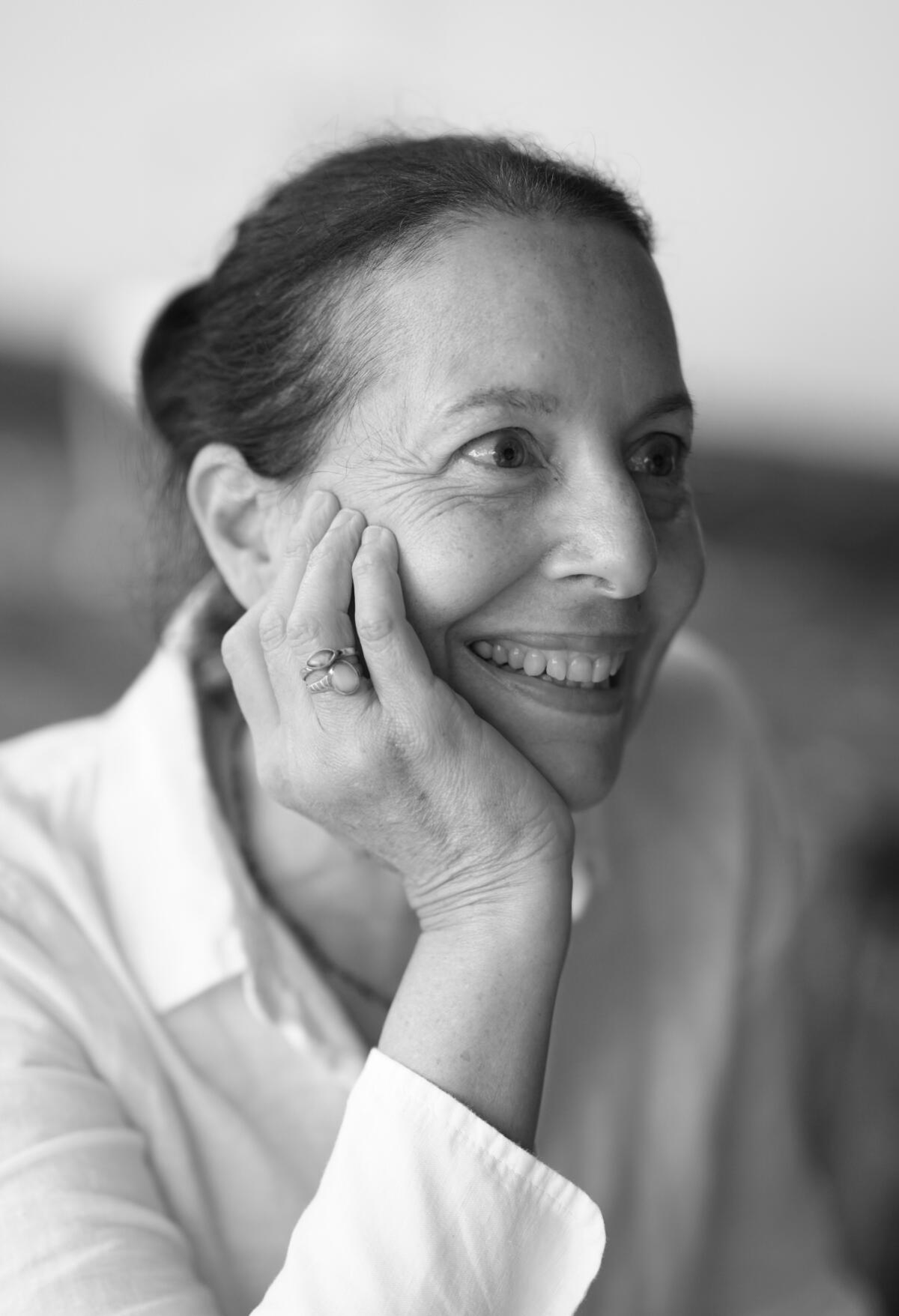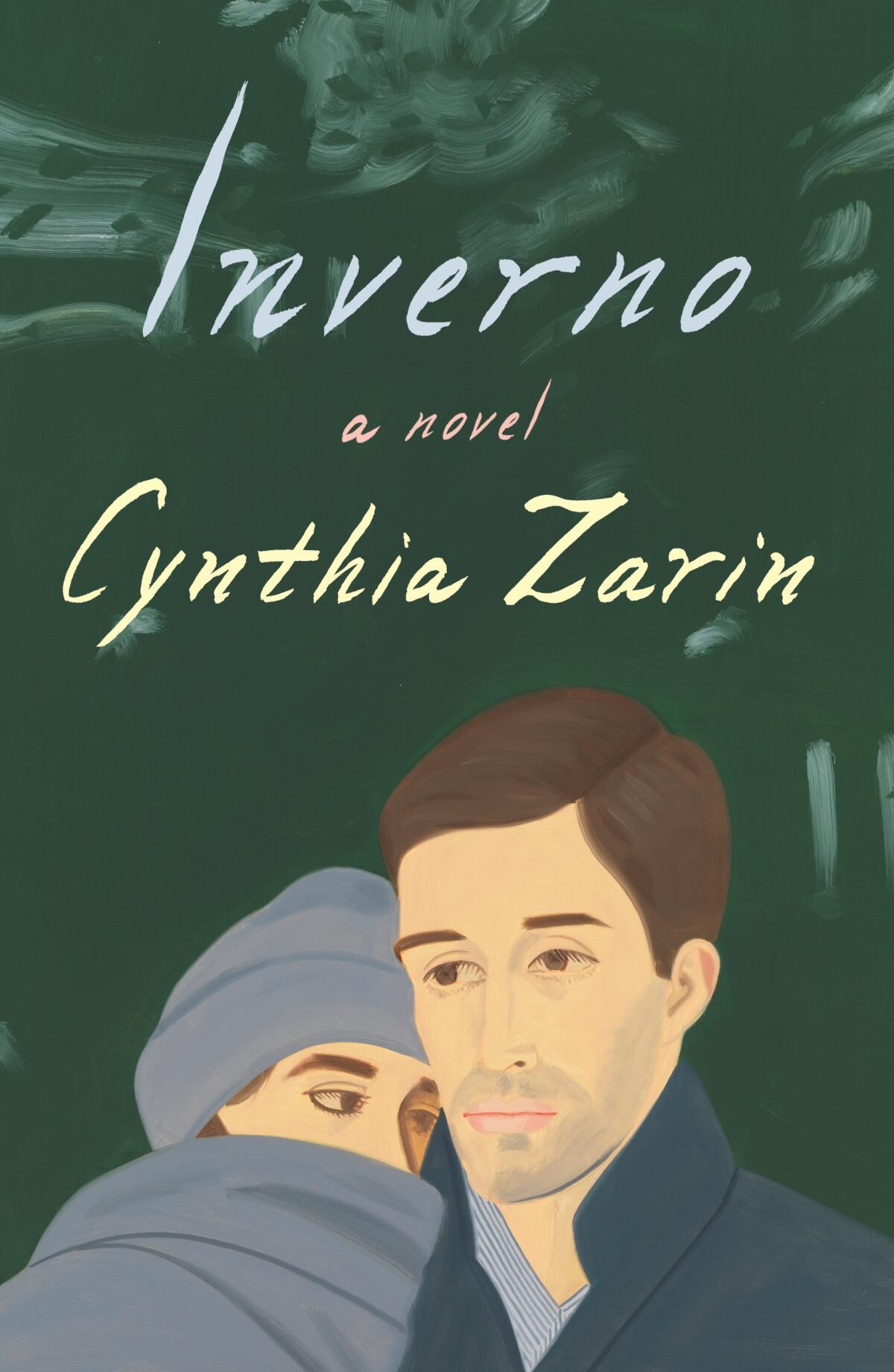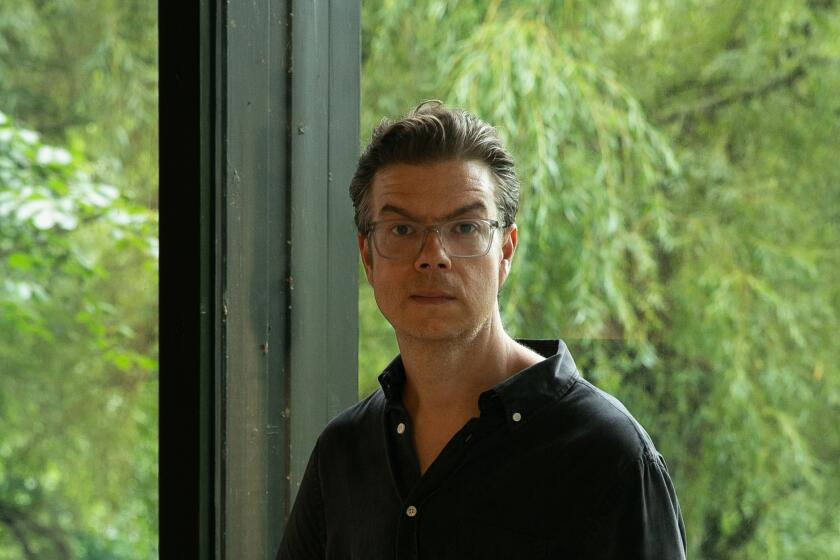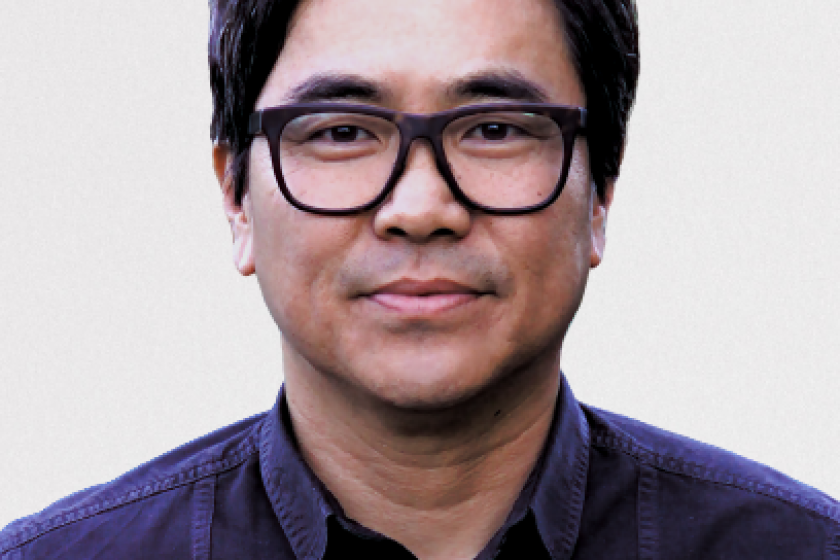How one acclaimed poet’s long, private letter became a short, stunning novel

- Share via
On the Shelf
Inverno
By Cynthia Zarin
FSG: 144 pages, $25
If you buy books linked on our site, The Times may earn a commission from Bookshop.org, whose fees support independent bookstores.
Cynthia Zarin has been hiding in plain sight. Or maybe it’s more appropriate to say the culture hasn’t pigeonholed her. At 64, she’s had a career as gloriously peripatetic as any I’ve encountered: a longtime New Yorker staff writer; the author of five volumes of poetry, two books of nonfiction and several works for children; a Guggenheim fellow who has seen two of her poems staged as ballets; and for some time a poet in residence at Manhattan’s Cathedral of St. John the Divine, where she was given an office up a “very, very windy stairway” overlooking its vaulted Gothic Revival interior.
Now Zarin has made another exhilarating pivot, publishing her first novel. The spare and impressionistic “Inverno,” out this week, functions in a lot of ways like a poem. Opening in February “near the north ball fields in Central Park in the snow,” the book relies less on narrative than on a series of overlapping memories and references, moving back and forth through space and time, reflecting both a keen sense of immediacy and a lifetime of experience.
‘The Lights,’ by acclaimed novelist Ben Lerner, is a poetry collection but so much more — part of a project that makes us question how we experience time.
“I was always surprised that time travel was viewed as science fiction,” Zarin mused last month, discussing “Inverno” over Zoom. “I’ve lived in New York almost my whole life, and so I’m constantly seeing myself coming and going. You know, you walk across the park and suddenly you’re 12. All of those things at once are happening all the time.”
“Inverno” establishes this perspective from the outset, as Caroline, like her creator a Manhattanite born and raised, waits in the park for her phone to ring. She is hoping to hear from her on-again off-again paramour, Alistair, but in the slippery territory of the novel, he is already there.
“In the same few square hundred yards where Caroline is waiting,” Zarin writes, “… Alistair is crouched in the dark forty years ago.” It’s an unexpected move, and a bold one: a book embodying its own sensibilities.
If this sounds autobiographical, or perhaps autofictional, that’s not exactly the case. Yes, “Inverno” grew out of a piece of private writing: “a long letter to someone,” Zarin said, keeping the identity of that recipient vague. Yet the novel evolved incrementally from public to private, epistle to narrative as the scope of the vision enlarged. “I started writing a whole lot of things,” Zarin explained, “some of which were true and some of which weren’t true. I had no idea that it was anything, I was just doing it for my own reasons. I ended up with quite a lot of prose.”
This is the way a poem gets built, or for that matter a life. We set out to do one thing and it becomes another. We step into a park where we once played as children and possibility telegraphs into the future and the past.
Joan Didion’s ‘Play It as It Lays’ is the third most popular L.A. book among writers surveyed by The Times. David L. Ulin explains why her fiction matters.
“I was never a person who thought, ‘Oh, I want to be a novelist, or I have a novel inside me,’” Zarin admitted with a quiet laugh. “In fact, I never thought I wanted to be a journalist. I’m someone who things kind of happened to, you know. And I just emerge, having, in some ways bullied or in a trance, walked into them.”
“Inverno,” which comes in at a tidy 132 pages, is a case in point; it was whittled down from 400,000 words. “I had all this material,” she remembered, “and I didn’t know what it was or what to do with it, and for a number of years I would give parts to friends and say, ‘What do you think it is?’ And they’d say: ‘Well, sweetheart, we think it’s nothing. It’s all voice but it’s not a book.’”

Eventually, another friend, the writer and artist Leanne Shapton, offered a key piece of advice: “Stop trying to put it together and take it apart.”
Shapton’s prompt is reminiscent of “Oblique Strategies,” a box of cards containing more than 100 aesthetic “instructions,” created in 1975 by Brian Eno and Peter Schmidt. Zarin riffs on it early in “Inverno”: art imitating life, or the other way around. “[B]ecause it is a pack of cards,” she writes, “it carries with it all the melodies of chance, of winning and losing.” She’s referring to the effect of randomness, which has long seemed to me essential for art making.
And yet, Zarin cautions, nothing is so simple. “There’s chance,” she agreed. “But I think there’s also simply paying attention. If you really pay attention, all kinds of things occur to you, or you make connections you might not otherwise make. So it’s chance, but you have to put yourself in the way of chance.”
Put yourself in the way of chance: what Zarin has been doing throughout her writing life. In “Inverno,” she has managed to create a form as fluid as her own imagination, one that follows the line of the language to places she didn’t know she would go.
“I’ve done a huge amount of journalism,” she said, “long profiles, and many, many smaller reporting and critical pieces. And the fact is, I never know what I’m doing. I just start, you know.”
Fresno’s Lee Herrick is set to become California’s 10th poet laureate. I asked him about his goals and what makes the state an ideal place for the art form.
With “Inverno,” this sense of guided improvisation emerges in the narrative itself, implicating not only Caroline and Alistair, whose lives keep intersecting and disconnecting, but also the novelist. At various points, Zarin shifts from third to first person, then integrates a second person voice, the book’s private reader, which becomes the object of a heightened strategy of direct address.
In part, this is the residue of the letter from which “Inverno” developed: Zarin realized “this story about Caroline was being told to somebody else.” As the novel deepens, that somebody else becomes less reader than character or even critic. “He makes fun of the narrator,” the author told me. “Or he’ll say, ‘You’ve been telling me this story and now you’ve left Caroline in the snow.’ … He’s saying to her: ‘Hurry up,’ and by doing that, he’s helping her to get to the middle of the story, which is difficult for her.”
This may sound meta or experimental, but it’s more a matter of honoring her own curiosity — and upending expectations.
At Yale, where Zarin has another long-standing affiliation, she teaches a class in writing across literary genres. “We talk about why something is a poem,” she said, “and it’s just fascinating. Of course, there are no answers, but we don’t need answers. We just need questions, always.”
And “Inverno” is a book of questions. A character study of Catherine and, to a lesser extent, Alistair, it is also a meditation on identity and memory. In places, recollection falters, as it does for all of us; the same incident will be replayed as having taken place in 1986, or 1987, or 1985. In addition, Zarin incorporates a number of external narratives, including the 1971 film “Sunday Bloody Sunday” and Hans Christian Andersen’s fable “The Snow Queen.” It is essential, she is saying, for this book, this imagination, to remain in conversation with all the others that have left an impression.
“Second Place,” Rachel Cusk’s first novel after the radical, brilliant “Outline” trilogy, follows a forceful woman who’s had enough of difficult men.
“People who are really interested in books and movies are influenced,” she remarked toward the end of our conversation. “It’s because they’re looking for something, maybe, that life doesn’t supply.”
Then, just as it feels as if we may have reached some conditional conclusion, Zarin complicates the landscape yet again. She recalls a former student who resisted this idea of influence. “We were reading all these essays,” she said, “and he raised his hand and said, ‘The problem with everything we read is that it’s written by a writer and not everybody feels that way.’ It’s one of my favorite things a student ever said.”
The point is that literature isn’t for everyone, that nothing really is. We all have our own signs and guideposts. We all invent it as we go along. “It’s hard to imagine that to be the case,” Zarin said, offering another laugh, “but many people live their whole lives and never read Jane Austen or Don DeLillo or Pynchon or Tolstoy. Or anybody.”
At the same time, they are here — the novels, the memories, the chance moments. Waiting for us. Hiding in plain sight.
Ulin is the former book editor and book critic of The Times.
More to Read
Sign up for our Book Club newsletter
Get the latest news, events and more from the Los Angeles Times Book Club, and help us get L.A. reading and talking.
You may occasionally receive promotional content from the Los Angeles Times.











